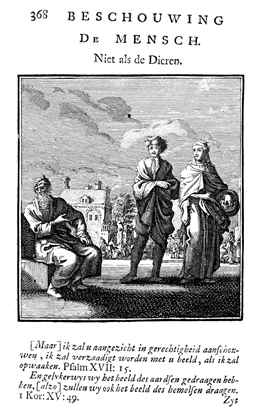Man: Not Like the Animals
Author: Luiken, Jan, 1649-1712
Image Title: Man: Not Like the Animals
Scripture Reference:
- Genesis 1 (further images / scripture text)
- 2 Corinthians 3 (further images / scripture text)
- 1 Corinthians 15 (further images / scripture text)
- Psalms 17 (further images / scripture text)
Description: An old man sits on a bench in a town’s square; he points to a young couple standing next to him. In the background are houses and people. The Dutch artist and poet Jan Luiken (1649–1712) was responsible for drawing this emblem and composed the poem that accompanies it. The etching was executed by Jan Luiken or his son Casper Luiken (1672–1708) who adapted this image from one used in an earlier work, which may be found in the Digital Image Archive under the call number 1699Weig. The attendant scriptures are Psalm 17:15, 1 Corinthians 15:49, Genesis 1:26, and 2 Corinthians 3:18.
Motto:
If thou art called Man,
Live as it becomes a Man.
Poem:
The Man, the Man, that noble image,
In which a sketch of the creator plays,
Man, raised so high!
(Far above life of this time,
That crawls, or swims, of flies or grazes,)
Created for an eternal life:
How he should spend his noble pledge,
Of distinctive intellect,
So well and worthy!
But sadly alas! what would he! no,
He struts hither as over pearls,
Looking for fleeting vanities.
He wastes his diamond time,
For straw and chaff of vanity,
Yes more base than the dumb animals,
Since his root is deeper,
He bears an abundance of evil,
And does not want to steer a correct course.
So is the privilege from God’s hand,
(To attain a higher status,)
Disdained, neglected, and forgotten.
Miserable odorless child of man
That otherwise so loves wellbeing,
What sorcery has possessed thee!
But yet, he who in the great field,
(Where mankind is considered like grass)
Appears like a little Flower;
So here and there, broad and spacious,
Very thinly sowed, and widely spread out,
He lends his ears to such Salvation.
So that he despises the animal behavior,
And attempts the life of Angels,
So as to finally reap the high fortune,
(When the earthly garment is taken off,)
To stand eternally in God’s image,
For which he was by him created.
O Man, O Man! Consider this,
How dear is thy high aim,
How little is the happiness of life’s times!
Which with its imperfect condition,
Is customary to keep, yet from the hand,
All moments slip nonetheless away.
How dear is the lasting good,
For the imperishable soul,
The roots of which reach Eternity!
So that its bloom of true status,
Does not perish in eternity,
And its fortune does not retreat from it.
O Man! who art the supreme creation,
Of all the things of this time,
Thou must not flow with them hither,
After the followers of the common life,
But may they be for thee, like steps,
To rise up to the origin.
When thou dost then consider the world,
That the Mightiest has built,
With all its flock and wonders,
Then make a wise turn,
To one who is the greatest Lord,
So as to step into his Eternal favor.
(Translation by Josephine V. Brown, with editorial assistance from William G. Stryker)
.
Click here for additional images available from this book.
Request a high-resolution file (fees apply)
Rights Statement: The online edition of this work in the public domain, i.e., not protected by copyright, has been produced by Pitts Theology Library, Emory University.
Rights Status: No Copyright - United States
Pitts Theology Library provides copyright information as a courtesy and makes no representation about copyright or other legal status of materials in the Digital Image Archive.

